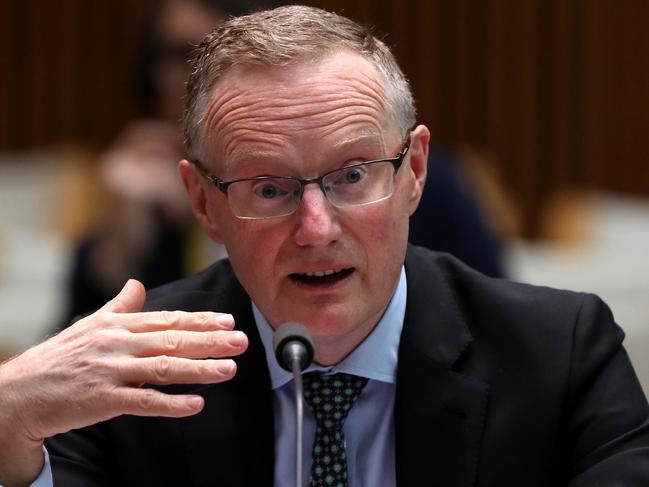RBA head’s dire warning: ‘Our economy will suffer’
The head of the Reserve Bank has issued a warning to Australia’s banks, saying their response to the royal commission could have dire consequences.
Banking
Don't miss out on the headlines from Banking. Followed categories will be added to My News.
The head of the Reserve Bank of Australia has issued a warning to banks changing their practices in response to the bad behaviour brought to light at the banking royal commission.
RBA governor Philip Lowe said in a speech last night banks were becoming too cautious.
“A percentage of borrowers will end up in financial strife and be unable to meet their obligations,” Mr Lowe said in his speech entitled “Trust and Prosperity”.
“We need banks to be prepared to make loans in the full expectation that some borrowers will not be able to pay them back.”
But he couched these remarks by saying often the penalties for “not doing the right thing” had in some cases “been too light”.
“Banks need to take risk and manage that risk well. If they become afraid to lend simply because of the consequences of making a loan that goes bad, our economy will suffer,” he said.
AMP Capital chief economist Shane Oliver said there was a risk lending was going from “too easy to too tight” and it was significant that the RBA had identified it, suggesting a rate rise was a long way off.
“But the last thing we want is a situation where banks don’t want to lend to reasonable borrowers because they feel they’ll be blamed when they go wrong,” Mr Oliver said.

REGULATORS CAN’T BE EVERYWHERE
Lowe’s comments at the Committee for Economic Development of Australia (CEDA) last night were the latest in a series from Australia’s regulators.
In July Wayne Byres, who heads up the Australian Prudential and Regulatory Authority (APRA) made similar comments when he said it was important that Aussies remained responsible for their own borrowing.
“It is important that the concept of caveat emptor (buyer beware) remains in the system,” he said.
“Regulators cannot be everywhere overseeing everything. It is important the community understands that.”
University of Melbourne dean of business and economics Paul Kofman echoed these sentiments, telling news.com.au that many customers who had been caught up in scandals like Storm Financial “should have known better”.
“A large number of people investing in dodgy schemes and funds and taking irresponsible loans are done by people who are quite financially literate,” Prof Kofman said.
Mr Oliver was of the same mind, saying borrowers needed to “take a degree of responsibility” for their financial decisions.
TRUST AND RESPONSIBILITY
Trust was the key feature of Mr Lowe’s speech, saying that the banking royal commission and five years of flat wages was damaging trust in Australia.
“Flat real wages are diminishing our sense of shared prosperity,” he said.
“The lack of real wage growth is one of the reasons why some in our community question whether they are benefiting from our economic success.”
Tightening bank lending has been pointed to by many as a key cause of declining house prices, but there are now growing concerns from some corners that the tightening has gone too far.
“It is clear that the behaviours highlighted by the royal commission have dented the community’s trust in parts of our financial sector,” Mr Lowe said.
“Strong penalties can play an important role in incentivising good behaviour, and this is an area we should be looking at.”
Prof Kofman, said there a balance between “irresponsible” and “sufficient” lending needed to be struck.

He said without this the continued difficulty in accessing credit would push many Australians into the arms of “non-bank financial lenders” who would provide loans at much steeper rates.
“What you effectively do is exclude a number of borrowers from formal finance and they would have to resort to informal lenders,” he said.
House price decline good for affordability, bad for the economy
In a sign the RBA was watching the housing market closely, Mr Lowe directly pointed to falling house prices in Sydney and Melbourne, which was coming at a time of flat real wage growth.
“It is important to remember that these declines come after very large run-ups in housing prices in these two cities, which made purchasing a home difficult for a significant number of people,” he said.
House prices in Australia are 44.8 per cent higher over the past decade and 209.9 per cent over the past 20 years, with CoreLogic data suggesting prices are now back to where they were at the start of 2017.
Some have suggested the correction is taking the housing market back to more normal levels.
Commsec Senior Economist Ryan Felsman said that if people continued to struggle to access credit it may “potentially exacerbate a slowdown in the broader economy”.
But Mr Felsman said it was not all bad, and that house prices needed to fall to get affordability under control.
“My view is we’re going to get a correction of 10-15 per cent in Sydney and Melbourne,” he said. “Like everything in the asset market there are winners and losers.”
Originally published as RBA head’s dire warning: ‘Our economy will suffer’


